#I adore those and generally agree they're the best games in the series
Explore tagged Tumblr posts
Text
I can’t take people who say that Sneasler is the worst pokemon ever designed seriously when Aromatisse has existed since 2013. Especially since Sneasler is kind of the poster child of video essays regarding why “Legends Arceus bad”.
Let’s be real here, if Blaziken and Lucario were 8th/9th gen pokemon rather than 3rd and 4th gen respectively, they would be loathed and reviled instead of seen as untouchable and iconic.
#pokemon#pokemon memes#hey I have my issues with modern Pokemon too even if I usually go to bat for any given main series game#and by usually I mean any game that isn't BDSP#I'd sooner stand up for baby's first bethesda game in Scarlet and Violet than BDSP#I will say that we're in a dark age for the franchise#but it's a Disney dark age#Sure we get our Black Cauldrons and our BDSPs#But we also have our Fox and the Hounds and our Legends Arceus(es?)#TLDR the Pokemon fandom gives me a migraine#The DS generation has become the thing we hate the most in the Genwunners who shot down BW for dumb reasons all those years ago#It pains me to admit this as a staunch fan of the DS era#I grew up with D/P/PT and BW/BW2#I adore those and generally agree they're the best games in the series#but wow the fans can be so elitist#they're so condescending towards all the 3D games and get more obnoxious with each new game#And like guys considering we've had more anthropomorphic-style pokemon since Gen 3#I legit don't get the hate behind pokemon like Incineroar or Meowscarada or Sneasler#Again if the Gen IX and Gen III starters were swapped y'all would be revering Meowscarada as your right hand man and childhood best friend#While Blaziken would be the one people scream AAA TWO LEGS KILL IT at#It's the truth and you know it#also if they're purely hated because internet artists will draw weird art of them like not being bipedal has stopped them before#see Absol and Latias and Serperior#TLDR stop gatekeeping#and I'm not asking you to turn your brain off but if you go in looking for things to hate of course you're going to have a bad time
15 notes
·
View notes
Text
New today on DA:TV from Game Informer: 'A Deep Dive Into BioWare's Companion Design Philosophy In Dragon Age: The Veilguard'
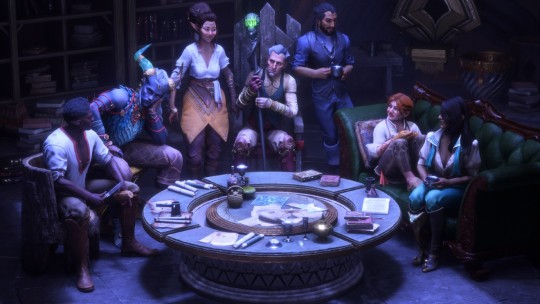
"A Deep Dive Into BioWare's Companion Design Philosophy In Dragon Age: The Veilguard by Wesley LeBlanc on Jul 15, 2024 at 02:00 PM During my visit to BioWare in its Edmonton, Canada, office earlier this year for the current Game Informer cover story on Dragon Age: The Veilguard, I heard a sentiment repeated throughout the day from the game's leads: in past Dragon Age games, BioWare stumbled onto great companions, but with Veilguard, it's the first game where the studio feels it purposefully and intentionally created great companions. As such, those companions are key to everything happening in Veilguard. With such a significant emphasis on these characters, I spoke to some of the game's leads to learn precisely about BioWare's philosophy on companions in Veilguard. [embedded link to DA:TV reveal trailer] "No, that is the case," BioWare general manager Gary McKay tells me when I ask if he agrees with the stumbled-onto-greatness sentiment. "I would first start with Dragon Age – each installment in this franchise has been different, so we didn't set out to make a game that was a sequel or the same game as before. We really wanted to do something different and we did push the envelope in a couple of areas, companions being one of them. Once we got knee deep into it, we really realized we had something special with these companions, again, around the motivations, the story arc, and it really started to become the centerpiece for this game.""
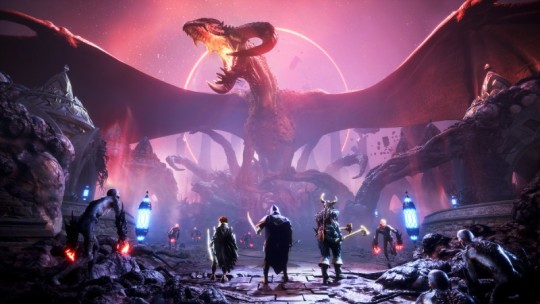
"The Philosophy Behind Dragon Age: The Veilguard’s Companions Game director Corinne Busche agrees, adding that Veilguard's companions are "the most fully realized complex companions we've ever crafted." She also believes they're the Dragon Age series' best. "They're complicated, they have complicated problems, and that's what's interesting," she continues. "As much as I adore the companions and the journeys I've been on with them in past Dragon Age titles – previously, it feels like companions are going on an adventure with me, the main character, whether it's the Hero of Ferelden or Hawke, you name it. But in [Veilguard], in many ways, the companions are so fleshed out that it feels as though I'm going on a journey with them. I'm exploring how they think and feel; I'm helping them through their problems. We're working through their unique character arcs. They feel like my dear friends, and I absolutely adore them." Busche says these companions participate in the game's darker and more optimistic parts. "We've really moved into a place where you can have the highest of highs, and it can be colorful, it can be optimistic, but also, you can have the lowest of lows where it gets gritty, it gets painful, it gets quite dark. But throughout it all, there is a sense of optimism. And it creates this delightful throughline throughout the game." When I ask creative director John Epler about BioWare's philosophy behind Veilguard's companions, he reveals a phrase the studio uses: Dragon Age is about characters, not causes. "What that means for us is [...] let's take the Grey Wardens, for example – the Grey Wardens are an interesting faction but by themselves, they don't tell a story, but there are characters within that faction that do," he tells me. "And the same thing with other characters in the story. They represent these factions, they show the face of the other parts of Thedas and of the storytelling we really want to do, which, again, shows Thedas as this large, diverse living world that has things going on when you're not there.""
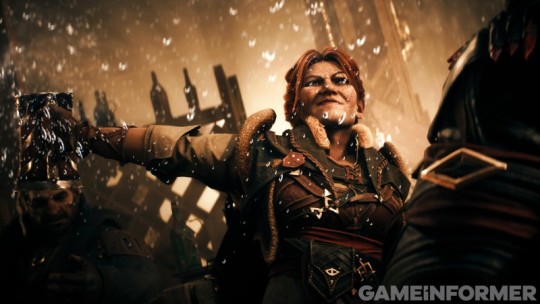
"Epler says one of BioWare's principles when creating Veilguard was that the world exists even when you – Rook – are not around. There are things, ancient conflicts, grudges, and more, that happen even when Rook isn't participating in them, he says. "You kind of come in 'in media res' in some of these, so that's where we wanted to go with the companions," he says. "They have stories of their own. Where can Rook come into these stories, and what interesting ways can those stories develop not just based on themselves but also based on Rook's presence within them?" Dragon Age series art director Matt Rhodes adds that companions are the load-bearing pillars for everything in Veilguard, so "when you're designing them, it's not just designing a character; they're the face for their faction, the face for, in [some cases like Bellara Lutara], an entire area of the world." From his aesthetic-forward part of developing companions in Veilguard as the game's art director, he tells me Veilguard's characters are (hopefully) going to give cosplayers a challenge. "The previous art director had the mindset we should make things easier for [cosplayers], which I think is a misunderstanding of cosplayers," Rhodes says. "We've seen the kind of challenges they're willing to take on, and so we've gone for, in some cases, a level of complexity and detail that I hope a lot of them are excited to rise to the challenge for." A Quick Detour: Neve Gallus"
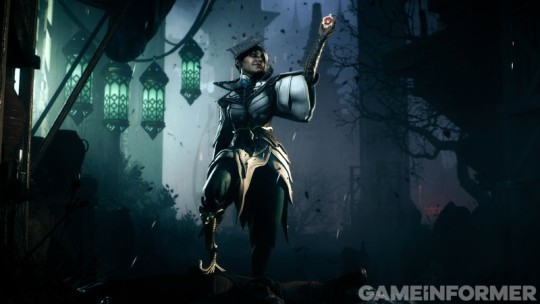
"As Neve Gallus is the companion I spend the most time with during my visit to BioWare, I asked Epler about this character and her role in the game. Here's what I learned: "So Neve is a private investigator in Minrathous. Minrathous is the capital city of the Tevinter Empire. It’s also a mage-ocracy; mages run the entirety of the Empire – they’re all-powerful. A lot of them still believe in slavery, they keep slaves, it’s a very oppressive, totalitarian regime. And Neve is a member of the Shadow Dragons, which is a rebel faction within Thedas that fights back against this mage-ocracy, fights back against this oppressive, very damaging regime that’s taken over the city, because she believes there’s good, and she is there for the common people. So if you’re not a mage in Tevinter, you are lower than dirt for a lot of people. She and the Shadow Dragons, in general, fight back, but Neve, in particular, is this character that represents this more, ‘voice of the streets, the voice of the common people.’ In previous Dragon Age games, you go to Orlais, you meet Emperor Celene, you meet Briala; we wanted to have a character that showed not just what is Tevinter at the top, but what is the average person who lives in Tevinter. And she is very much about, again, fighting oppression, fighting tyranny and, as a private investigator, finding clues and ways through problems that aren’t maybe as action-focused as some of the other companions." Companions, In And Out Of Combat"
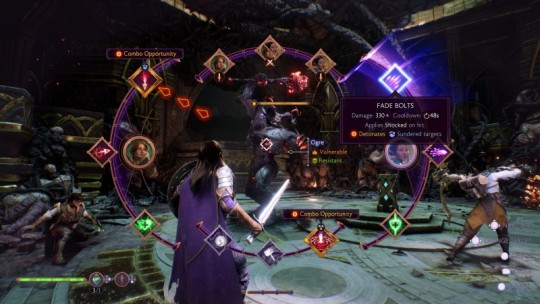
"Rook's companions in Veilguard have roles both in and out of combat, but since I only saw a few hours of this game (which is sure to be multiple dozens of hours long), I wanted to ask Busche about these roles and how they play out. Here's what I learned: In Combat Bushce: "So companions as realized characters, we have to take that premise when we talk about how they show up in combat. These are their own people. They have their own behaviors; they have their own autonomy on the battlefield; they'll pick their own targets. As their plots progress, they'll learn how to use their abilities more competently, and it really feels like you're fighting alongside these realized characters in battle. So I love that, I love the believability of it. It feels like we're all in it together. "But then when it comes time for the strategy, and the progression I might add, that's where a sense of teamwork comes into play as the leader of this party as Rook. When I open the ability wheel, I almost feel like we're huddling up. We're coming up with a game plan together. I see all the abilities that Harding has, and I see all that Bellara is capable of, and sometimes I'm using vulnerabilities synergistically. Maybe I'm slowing time with Bellara so that I can unleash devastating attacks with Harding, knocking down the enemy, and then me as Rook, rushing in and capitalizing on this setup they've created for me. It is a game about creating this organic sense of teamwork. "Now, there are more explicit synergies as well. We very much have intentional combos where your companions can play off each other, you can queue up abilities between them, and each of those abilities will go off and have their effect. But it results in this massive detonation where you get enhanced effects, debuff the entire battlefield, all because of planning and teamwork. What makes it really cool is you can introduce Rook into that equation as well. One of my favorite things to do is upgrade some of Harding's abilities so she will automatically use some of these abilities that normally I'd have to instruct her to do. And she'll actually set my character up to execute that combo that, again, has that detonation effect." [embedded link to DA:TV gameplay reveal video]"
"Outside Combat Busche: "It's one of my favorite topics. I talked about the idea that these are fully realized characters, that they're very authentic and relatable. So outside of combat, what that means is they're going to have their own concerns, fears, distractions, and indeed, even their own sanctuaries, their own personal spaces. In our base of operations this time, our player hub, the Lighthouse, each of the companions has their own room. And what I love about it is it becomes a reflection of who they are. The more time you spend with them, as the game develops as you work through their arc, their room and their personalities will evolve and flourish and become more complete as they trust you more and you understand them better. "What's interesting, you mentioned romance, the companions also develop romantically and I'm not just talking about with the main character Rook; I'm talking about each other. There are moments in the game where two of our companions fell in love with each other and I had to make some pretty challenging choices as it related to the quest we're on. And it broke my heart, it absolutely did [Editor's Note: I get the sense Busche is talking about a specific playthrough of Veilguard here – not a definitive sequence of events for every playthrough]. "So I would say, as you're adventuring with them, as you're returning to the Lighthouse and getting to know them – all these decisions and conversations and things you learn about them – it endears them to you in a way that I honestly haven't experienced before. And sometimes that fills me with joy and sometimes it breaks my heart." For more about the game, including exclusive details, interviews, video features, and more, click the Dragon Age: The Veilguard hub button below."
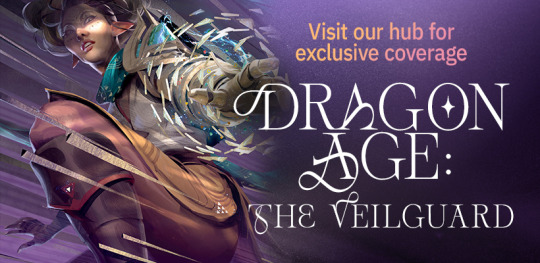
[source]
#dragon age: the veilguard#dragon age the veilguard spoilers#dragon age: dreadwolf#dragon age 4#the dread wolf rises#da4#dragon age#bioware#video games#long post#longpost#feels
188 notes
·
View notes
Note
I'll try to keep it short because you're very kind but I'm becoming annoying... I actually like Soichiro. It's his morals I cannot stand. In fact, in line with his, I like Matsuda's and even Light's variations more, even with all the darkness they entail, because they're more critical. I adore L and find him relatable, but I'm not so sure if I'd like him as a person in real life, and yet I again like his morals more than Soichiro's. I still think Soichiro is generally a better person than any of the others. I still dislike his morals the most. When I say at the opposite end of Soichiro in the moral spectrum is where Near stands I'm not talking just about my personal liking, but as I interpret their views on morality. Maybe there's some detail of the manga I'm forgetting (I truly have to reread it), but Soichiro didn't seem very critical about... anything, while Near states something like "even if god came and told me this is good and this is bad and this is The Truth I'd still consider and come to my own conclusion". I like that. I care less about someone getting a moral with what I may consider a degree of grey if they do that. I myself have very strong morals that nonetheless have degrees of grey; strong doesn't mean pure. My grey and someone else's grey might be very different. But I've developed them, not accepted them blindly. Near of course, Mello, L, and even Light and Matsuda do this, but Soichiro generally doesn't. And I dislike that greatly. In fact, I think I'd find him kind in real life, and likeable, but I'd not really like him because I can't really bring myself to like someone like that even when they're kind and compassionate and good. I'm already talking more than I intended but I'll try to point out what bothers me of his attitude.
Soichiro is very very anti Kira, but he's working for a government with the death penalty and he doesn't seem to consider that even for a moment. For him, that the government does it is justifiable but monstrous if a person does it. He doesn't really have a justification, it's just like that because it's as it is. He's very against L's methods, buy L uses people who were going to die anyway at the very moment he uses them either way because of the death penalty, because of the government. From a government pov, if the government were to do what L does, it'd be something terrible. From an individual pov? Not so much. It's ugly, but it's beyond himself whether that people die or not, and his decisions are easily justifiable from an individual pov: they're going to die irrevocably, that very day at that very time, and he is using what he can to solve a very complicated case that is taking many lives, and he even might use the moral support of "I'm giving the prisoners the chance of choosing, with the potential reward of lifelong imprisonment instead of death". And again, while a government doing that is terrible, it's not as terrible for a person. L is a private detective, an individual. People can be fallible. Governments shouldn't. What L does might be justifiable, if ugly, for a person, but it would be unforgivable for the government to do. But the government lies on L and it's L who takes the slander of the rest of the Task Force. And that's what Soichiro doesn't see, and that's what bugs me. Soichiro sides with the government and the laws no matter what, no matter if they're terrible and are actually the cause if indirectly of the terrible things L is able to do (I'd have to reread to be completely comfortable affirming this, but Soichiro's attitude towards the government reminds me a bit of Mikami and Misa to some extent).
Soichiro hates Kira, and hates and criticises L's methods and his ruthlessness, but doesn't even consider for one moment the problem is not L. The problem is not the 24 yo boy/man, the problem is his government, that has the dead penalty and actually let's a private detective carry on with the investigation and do as he pleases (and I'm not even taking into consideration how L's upbringing and the lowkey if fun exploitation he was subrmited to have most probably influenced if not determined the way he acts in these cases, because while it's intriguing it'd feel like justifying L out of pity, and either way Soichiro doesn't know that; but I mention this because L's entire past at Wammy's, like the other children's, is another very terrible move from governments and adults in responsibility positions). The problem is Interpol, the governments in general, blatantly saying L is ruthless but not even setting rules when working with him. And I think it would actually have been very easy to stop L doing those things. Just change the rules of the game, tell him beforehand there are a few things he can't do. It's a game after all. Of course L would still exploit the moral and legal vacuums of the rules as he pleased, as one does when playing anything, but the government wouldn't have given him totally free way.
I'm not sure if I'm explaining myself very well. Years ago in a class I talked about the difference between personal vengeance and the death penalty. I feel this is similar. A person is fallible. A government should be able to stand over licit murder. L manipulating people to prove a point is ugly. A government doing that or letting someone free way to do whatever is terrible. L does whatever, and as an individual is not so horrible as it is that the governments internationally actually let him do whatever even knowing beforehand without setting rules. Soichiro sees this and it doesn't even cross his mind for a moment to criticise the government he's working with. Also, he considers his morals the best, which makes sense in a first person pov (why support x morals if you don't think they're the best? I'm not critisising this), but he's very... imposing about them, while as I say not being precisely the most critical thinker. That Soichiro is like this, morally (I'm not even talking about the policeman aspect though that's so often talked about in the fandom), makes a lot of sense to how Light ends up being Kira, and with how Matsuda thinks and acts. And I find that very intriguing, but I can't stand Soichiro's simplistic morals and his better-than-you attitude even though he's a generally good person. That's why I dislike his morals the most (of course you don't have to agree!). I don't stand by Near's morals either, but I like his "god could come and tell me and still I'd doubt" attitude. It's what makes gods mad in basically every mythology, but I love that kind of thought process. I'm very much like that too.
I'm so sorry this is so long. I tried to cut, but I got the impression it'd make it even less clear or more difficult to understand. Or maybe the lack of clarity lies precisely on how repetitive and long this is. I'd like to think English not being my first language has to do with this, but honestly the problem is most probably just me. I hope I made the point understandable enough, though. And thanks for your patience. I really liked that post of Near someone sent as an opinion and how you replied! Very interesting takes on both ends.
Hi again! You have some very thought-provoking points about it all, and don't worry, your English is excellent.
I loved Near's stance about these things as well, and that's something that really bothered me when growing up about some authority figures and institutions being really totalitarian and silencing of doubts or stances they deemed too negative or incorrect to voice aloud. I value having freedom of choice and the ability to think critically about everything immensely. Maybe it's because I went to a very strict and sheltering and weird little school as a child that tried very hard to indoctrinate me with a specific worldview, and always shamed and silenced anyone who disagreed or questioned them or felt like an outsider or wanted to have a different point of view. I remember relating the most to Matsuda on the task force when I first watched the show as a teen, because he was always speaking up with his devil's advocate questions or confusions. The way Soichiro and the others usually yell and scold and shame him for this bothered me a lot, because I wanted them to discuss things openly so I could see all the different sides of the arguments more clearly. Actually, I think this is a pretty culturally similar thing between Japan and Canada (where I am from). There's a strong emphasis on doing what's best for the entire group instead of just yourself, and being too controversial or outspoken or individualistic about certain things is often taboo and frowned upon as a big social faux pas. It's possibly quite a bit stronger pressure toward obedience and conformity and politeness in Japan in certain ways as well, but I don't know for sure as I haven't lived there myself.
I think Soichiro had a bit of nuance and flexibility with his morals and his stances in various instances throughout the plot, and to me he seemingly tries hard to see things from other angles during complicated moments in what must be one of the most difficult situations he could possibly face as both a police chief and a parent. But it's true he never seemed to doubt that upholding the laws already in place and the way his government punishes the convicted were the "correct" ways society should function. I think this series would be a really interesting one to discuss in a class that talks about stuff like justice and the death penalty and law and ethics and such for how many of these things it touches on in an entertaining and thought-provoking way!
19 notes
·
View notes